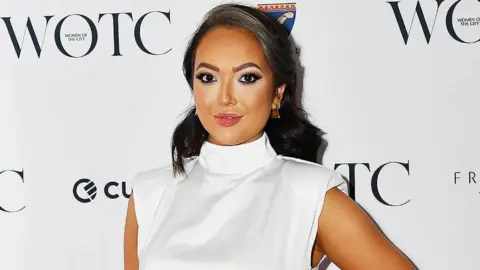Tokenism on reality TV: 'It can be a checkbox exercise'
 Getty Images
Getty ImagesWhen Sharon Gaffka saw fellow Asian Love Island contestant Shannon Singh get voted out on day two of the reality show in 2021, she thought to herself: "Oh, is that how it's going to go?"
Sharon fared better than Shannon - lasting 19 days in the villa before getting dumped, but she recently told the Secure The Insecure podcast she felt "Asian women were taken as a token or a tick box" in last year's series.
Sharon says she didn't feel any of the Asian contestants were given "an equal chance".
She's now told Radio 1 Newsbeat that she spoke out to "open conversation" and challenge tokenism in reality TV for people watching shows and wanting to see themselves represented fairly.
Tokenism is when there is only a symbolic effort to be inclusive to minority groups, to give the appearance of equality.
A report by Ofcom in July 2021 suggested the broadcasting industry could "perform significantly better" in terms of ethnic representation.
'Missed the mark'
Sharon admits the Love Island line-up initially made her feel "really excited", but the show "missed the mark" because there were no men who were interested in the Asian contestants.
And tokenism is something that's been felt by people who've appeared on other shows like The Apprentice and The Only Way Is Essex too.

Iasha Masood, who was on The Apprentice in 2019, feels there was "an element of tokenism" with her appearance.
"I think there's a part of the show where they didn't want me to be shown as intelligent or powerful.
"Often as a South Asian woman there's an image of us being small, meek and quiet."
'It's a checkbox exercise'
Iasha, 29, remembers conversations during filming, where she was saying things "honestly and intelligently" - but those didn't get shown.
"I thought they were just trying to make the show entertaining, but I think I did kid myself."
"Seeing a diverse cast of people is different to how they are portrayed," says Iasha.
"It's a bit of a checkbox exercise".
A spokeswoman for The Apprentice said: "We work hard to ensure the diversity of the UK is represented on and off screen.
"Our process is open to everyone, without discrimination. We represent all candidates in a fair and balanced light, and everything seen on screen is an accurate portrayal of events."
'I felt like an extra'
Vas J Morgan was on The Only Way is Essex for six seasons but says there was "a lot of trauma" around the show.
"I didn't think that [things were tokenistic] at the time, because I was raised in that system to ignore that."
Through school and social settings, it was "so normal to me being the token my entire life".
 Getty Images
Getty ImagesVas, 33, feels for most of TOWIE, he wasn't allowed to develop his own story and just "viewed as someone's close friend".
"I wish that my family could have been involved in some way, especially during sensitive storylines, like my sexuality."
He describes feeling "like an extra, a spare part just to be on screen".
Diversity on and off screen
Iasha is keen to emphasise that she does not "regret going on the show" because it was "a crazy and exciting experience".
But both her and Vas feel there are steps that can be taken to tackle tokenism such as unconscious bias training.
 Iasha Masood
Iasha MasoodIn a review of diversity in UK broadcasting, Ofcom found South Asian and black people in TV are less likely to be employed in senior management positions.
A spokesman for TOWIE said its "producers met with Vas two years ago to discuss the issues he raised", and agreed an increased commitment to diversity and inclusion was of "paramount importance".
They added "steps have been taken to ensure more diverse representation both on and off screen" with more cast members from ethnic minorities in the past two series and training initiatives in place to "tackle unconscious bias".
 Getty Images
Getty ImagesFor Love Island, Sharon says the show should research people's relationship history, adding "she was never asked about my type".
An ITV spokesman told Newsbeat it "has a commitment towards accelerating change in terms of Black, Asian and Minority Ethnic representation".
"Diversity and inclusivity are key priorities for us as a broadcaster and we are always looking to improve representation on screen and behind the scenes."
 Manrika Khaira
Manrika KhairaManrika Khaira finished second on The Circle and feels lessons can be learned from her positive experience.
"It's one of the most inclusive shows out there. It's rare to see anybody Indian or Asian on a reality TV show."
She tells Newsbeat the show felt different to other reality shows in terms of its casting, and others could learn something with "people of all shapes, sizes, background and colour" included.
The amount of screen time she got meant she "didn't feel out of place".
According to Dr Clive Nwonka, a lecturer in film, culture and society at UCL, someone picked for racial representation means their contribution can feel less valuable than "their white counterparts".
He adds on screen representation is just one part of a broader issue.
"So you can include black and brown faces, very easily if you want to play the tokenistic gesture, but that won't have any real material impact."


